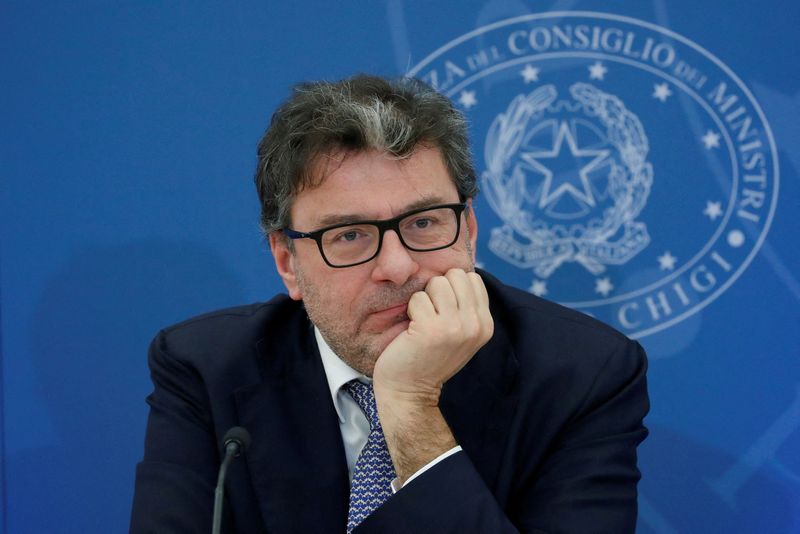By Valentina Za and Sara Rossi
MILAN (Reuters) -Italy will launch a new bond aimed at retail investors next week, targeting cash held in low-yielding bank accounts as it finds ways to compensate for dwindling European Central Bank debt purchases.
Market sources say the sale of new BTP Valore ("BTP Value") bonds with a four-year term could raise more than 5 billion euros ($5.5 billion).
But more competition from the government for savers' cash compounds a liquidity challenge for Italian banks, which face rising funding costs and must themselves start repaying some of the ECB's cheap crisis-era loans next month.
"There is ruthless competition for liquidity, which was once plentiful and is still available right now - but it hunts for the best returns," Bocconi University finance professor Stefano Gatti said.
Italian residents hold about 2 trillion euros on deposit. In April, they earned on average 0.29% on their current accounts, the Italian banking association said, compared with a gross yield of around 3.6% on a four-year BTP bond.
That contributed to a gap of 317 basis points between the cost of funds banks raised from households and businesses and the average rate they charged on loans.
Although bank credit to households and firms ground to a halt last month as lending criteria were tightened, such bumper margins on lending have helped the banks post record profits in recent quarters.
In June, however, they need to repay nearly half of 318 billion euros in longer-term ECB funds which will expire in full by mid-2024.
With their excess reserves falling short of the repayments due, the Bank of Italy has warned banks will need to tap markets, borrow in other, costlier forms from the ECB or shrink their assets.
That means that while the popularity of state bonds among retail investors poses a challenge for asset managers and life insurers too, it creates a particular headache for banks.
"There is a huge amount of deposits offering very low or no remuneration," Economy Minister Giancarlo Giorgetti said on Friday, discussing Rome's debt strategy.
The government is "obviously in competition" with banks when it comes to remunerating liquidity, he added.
"It seems to me natural and fair for the government to target the retail market," Giorgetti said.
SUCCESS
Intesa Sanpaolo (BIT:ISP) calculates the ECB will not replace 16 billion euros of Italian bonds bought under its asset purchase schemes when they mature in the second half, hence the government's renewed effort to woo domestic savers.
Retail buyers offered Rome a lifeline during the sovereign debt crisis of 2011-2012, when Italy needed to offset the flight of foreign buyers.
Expanding the range of products designed for small investors, it will launch the new four-year bond on June 5-9, with step-up coupons and a 0.5% loyalty premium for those holding it to maturity.
"It's not difficult to forecast the first issue of the 'BTP Valore' bond will be a success," Moneyfarm portfolio manager Roberto Rossignoli said.
The Treasury will detail coupon levels on June 1.
Italian savers held a fifth of domestic government bonds until the early 1990s but that share had fallen to 6.4% by 2021, a declining trend caused by low interest rates which started reversing last year.
Between July 2022, when the ECB began raising rates, and February, Italians added some 54 billion euros to their government bond holdings.
Over the same period residents' deposits with Italian banks fell by more than 70 billion euros.
So far that has prompted only branchless lenders such as digital bank illimity - now offering a 2.5% rate on current accounts - to boost returns on cash.
By contrast, online bank Fineco, which is focused on brokerage and investing rather than lending, is sticking to its zero remuneration policy on sight deposits - of which it lost 1.4 billion euros in January-April as wealthy clients snapped up government bonds.
"A year ago, small savers looking for decent returns had no alternative to products with high entry and management costs," professor Gatti said.

"Today a five-year BTP bond returns a net 3.2%-3.3%. That's easy: and so much for risk diversification. Italy is unlikely to go bust in three to five years' time," he added.
($1 = 0.9084 euros)